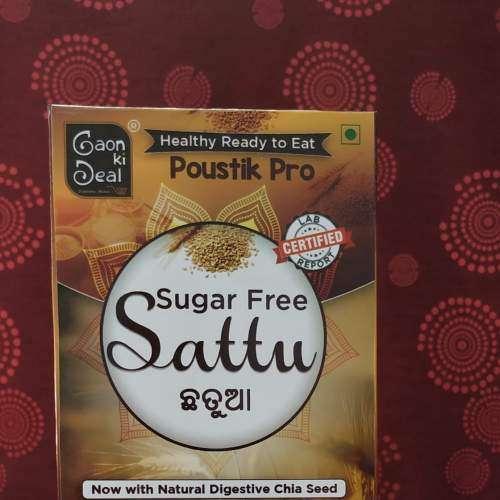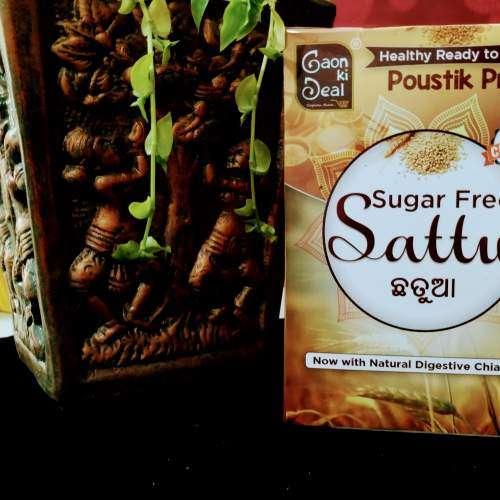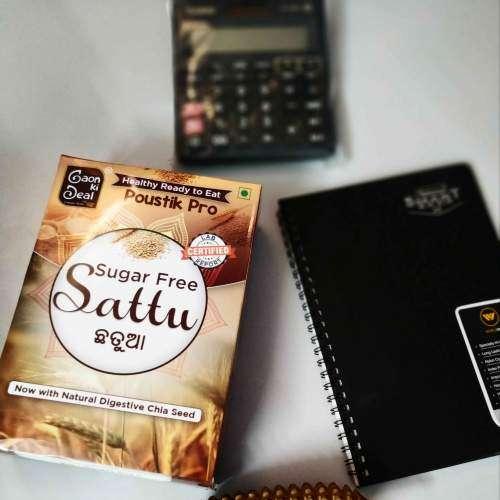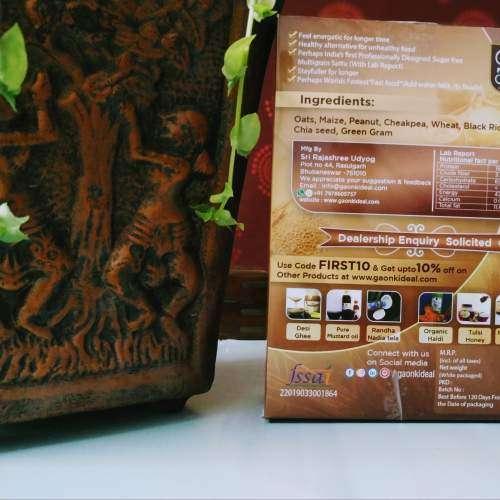Sugar Free Multigrain Sattu (Chatua)
₹120.0
Sugar-Free Multigrain Sattu is a nutritious and healthy food product that combines the goodness of various grains with the benefits of sattu. Sattu is a traditional Indian flour made from roasted grains and pulses, known for its high nutritional value and energy-boosting properties.
The Sugar-Free Multigrain Sattu is prepared by blending different grains like wheat, barley, millet, and oats with roasted Bengal gram (chana dal) to create a wholesome and versatile food item. This combination ensures a good balance of macronutrients such as carbohydrates, proteins, and dietary fiber.
The absence of sugar in this variant makes it suitable for individuals who are conscious of their sugar intake or have dietary restrictions. It can be a valuable addition to the diet of people with conditions like diabetes or those following a low-sugar or low-carbohydrate diet.
Sugar-Free Multigrain Sattu is typically ground into a fine powder, which can be mixed with water or milk to make a nutritious beverage. It can also be used as an ingredient in various recipes like rotis (Indian flatbread), ladoos (sweet balls), or added to shakes and smoothies for an extra boost of nutrition.
The product is often marketed as a natural source of energy, rich in essential vitamins, minerals, and dietary fiber. It may offer benefits such as sustained energy release, improved digestion, and a feeling of satiety. The combination of multiple grains adds to the nutritional profile, providing a diverse range of nutrients.
When purchasing Sugar-Free Multigrain Sattu, it’s important to check the product label for the specific grains used and the absence of added sugars or artificial sweeteners. Different brands may have slight variations in the composition, but the overall concept remains consistent—a sugar-free, multigrain-based sattu that offers a wholesome and nutritious option for a balanced diet.
You must be logged in to post a review.
Q & A
The sustainability of a specific product, such as Sugar-Free Multigrain Sattu, depends on various factors throughout its lifecycle, including sourcing of ingredients, production processes, packaging, and waste management. While I can provide some general insights on sustainable practices, it's important to note that the sustainability of a specific product can vary based on the brand or manufacturer.
Ingredient sourcing: The sustainability of Sugar-Free Multigrain Sattu begins with the sourcing of its ingredients. If the ingredients are sourced from sustainable agricultural practices that prioritize soil health, water conservation, and biodiversity preservation, it can contribute to the overall sustainability of the product.
Organic and regenerative practices: If the multigrain ingredients used in the Sattu are organically grown, without the use of synthetic fertilizers, pesticides, or genetically modified organisms (GMOs), it can be considered more sustainable. Additionally, if regenerative agricultural practices are employed, such as crop rotation, cover cropping, or agroforestry, it can enhance the sustainability of the ingredients.
Production processes: Sustainable production processes focus on minimizing energy and water consumption, reducing waste and emissions, and optimizing resource efficiency. If the manufacturing of Sugar-Free Multigrain Sattu follows such practices, it can contribute to its sustainability.
Packaging: Sustainable packaging options, such as recyclable or compostable materials, can significantly reduce the environmental impact of the product. Using minimal packaging or opting for packaging made from recycled materials further enhances its sustainability.
Waste management: Proper waste management, including recycling and composting, is crucial for reducing the environmental footprint of any product. If the manufacturer of Sugar-Free Multigrain Sattu has measures in place to manage waste effectively, it positively affects its sustainability.
It's important to note that while sugar-free and multigrain attributes may be beneficial from a health perspective, the sustainability of the product extends beyond these factors. It's advisable to research and look for certifications, such as organic, fair trade, or sustainable agriculture labels, to ensure that the product aligns with your sustainability values.
General Inquiries
There are no inquiries yet.






Reviews
There are no reviews yet.